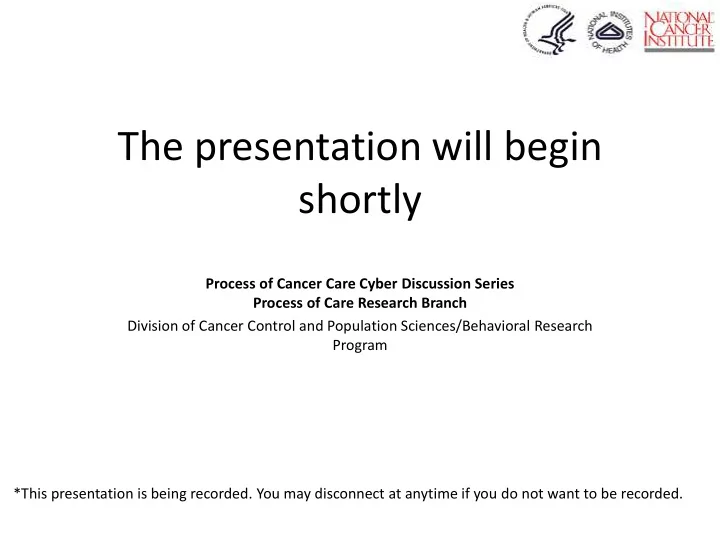

The presentation will begin shortly Process of Cancer Care Cyber Discussion Series Process of Care Research Branch Division of Cancer Control and Population Sciences/Behavioral Research Program *This presentation is being recorded. You may disconnect at anytime if you do not want to be recorded.
Participant Instructions • A GoToMeeting control panel will open on the top right-hand side of your computer screen once you’ve entered the meeting. • Click on the orange arrow to expand the control panel. If you would like to be unmuted and ask your question by phone, • please type in your name in the “Chat” box on the bottom of the control panel. Your line will then be unmuted. • You may also type your question directly in the “Chat” box to “All- Entire Audience.”
Improving The Process of Cancer Care Session 4 of a 5 part series Division of Cancer Control and Population Sciences/Applied Research Program Stephen Taplin MD, MPH, Veronica Chollette RN
Series Purpose – for NCI Solicit opinions from three sectors of the • community regarding problems in the quality of cancer care Providers, Researchers, Health Care Purchasers Identify potential research topics that might • address those problems Focus the research agenda of PCRB upon • major underlying factors affecting the processes of cancer care.
For Participants Understand the perspectives of three • communities with respect to problems in cancer care delivery • Learn conceptual, analytic, and practical approaches to understanding and addressing problems in cancer care delivery • Contribute to the development of NCI’s research agenda
Continuing the Discussion July 1, 2015, 2:00 PM - 3:00 PM EST Team Cognition: Understanding the Factors That Drive Process and Performance Dr. Steve Fiore To register, go to: http://dccps.nci.nih.gov/brp/pcrb/cyberseminars.html If you have questions, contact Veronica Chollette (cholletv@mail.nih.gov)
57 yo woman for “routine” care Seen 3-4 times/year by NP or 1 0 MD for hypertension, • hypothyroidism, mildly overweight • Physician misses she was due for mammographic screening, Rn catches it late in day after visit Referral is made by phone, education is limited, patient gets • confused – delays occur • Abnormality on screening exam is not communicated efficiently while 1 0 MD is on vacation • Biopsy done • Patient referred to surgeon for discussion and is told she has breast cancer
Day 25: Phone call from Radiology to Day 36: Receives Ultrasound and schedule Ultrasound additional Imaging Day 22 : Mrs. Young gets Radiology Group Day 37: Phone call from screening mammogram • Scheduler Radiology to schedule biopsy • Receptionist • Mammography and ultrasound technologists • Delays and mixed • Physicist Day 5 : Phone from messages • Dr. Imam describing need for mammogram Day 44: Biopsy in Day 2 : Surgical Care Radiology Primary Care referral Group Group faxed to • Receptionist • Receptionist radiology • Nurse • LPN • Physician • Nurse Ms. Young Assistant Practitioner Day 1 : Dr. • Dr. Teggan • Dr. Moore Moore sees Mrs. Young in Day 46: Primary Care Visit with Surgeon who • Delays during visit and in care & communicates cancer diagnosis missed opportunities to educate • Anxiety and confusion as Ms Young faces choices Day 48: Visit scheduled with Dr. Moore to get information about mammogram
The 7 C’s of Teamwork… Eduardo Salas, Ph.D. Department of Psychology & Institute of Simulation & Training University of Central Florida esalas@ist.ucf.edu
C O M M U Organizational N & I TEAMWORK Individual C Outcomes A T I O N
Cooperation… Attitudes & Beliefs: Team Orientation Collective Efficacy Mutual Trust Openness to Experience Good Teams… Develop collective efficacy Have strong team orientation
Coordination… Behavioral Mechanisms: Mutual Performance Monitoring Back-up Behavior/Supportive Adaptability/ Flexibility Good Teams… Self-correct Employ huddle, debriefs
Communication… Information exchange protocols: Close-loop communication Precise, Timely, Clarity Appropriate terminology Good Teams… Share unique information
Cognition… Shared understanding: Roles & Responsibilities Knowledge of team mission; Objectives, Norms, & Resources Familiarity with Teammates Good Teams… Have clear roles Team norms are clear
Coaching… Leadership: Team Leadership Promotes teamwork Cares about team members Sets ground rules Good Teams… Have coaches Set expectations Clarify roles
Conflict… Conflict resolution strategies: Interpersonal skills Psychological safety Good Teams… Deal with conflict, confront it Coaches create psychological safety
Conditions… Supportive context Good performance recognized & reinforced Access to resources Information needed available Policies, procedures & incentives aligns Leadership sends “signals” that teamwork matters
Question/Comments? Contact: PC3CyberDiscussions@icfi.com *This presentation is being recorded. You may disconnect at anytime if you do not want to be recorded.
Recommend
More recommend